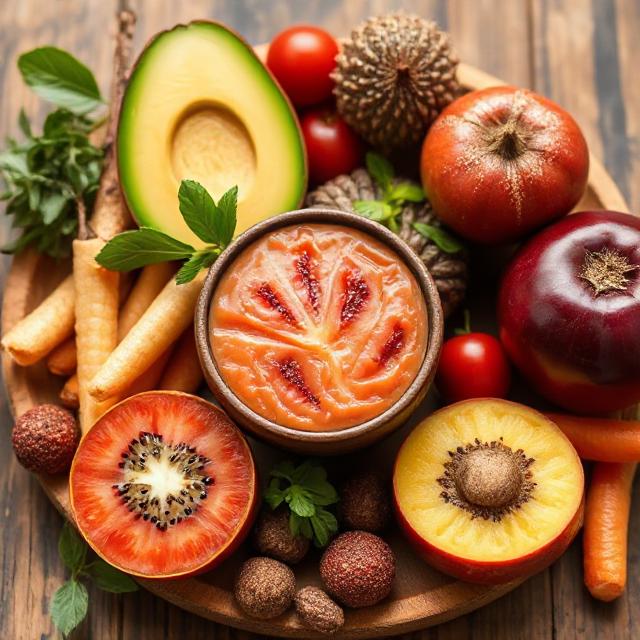In recent years, attention to intestinal health has gained significant importance in the fields of Alimentacion Prebiótica and preventive medicine. Among the concepts that have emerged strongly is Alimentacion Prebiótica , a dietary approach that seeks to enhance the health of the intestinal microbiome through the consumption of specific foods. This article delves into what Alimentacion Prebiótica is, its benefits, main sources, and recommendations for incorporating it into your daily diet to promote overall well-being.
What are Alimentacion Prebiótica?
Prebiotics are components of certain foods that are not digestible by the human gastrointestinal tract but serve as a substrate for the beneficial bacteria in the gut microbiome. When fermented by these bacteria, prebiotics promote their growth and activity, helping to maintain a healthy balance in the gut flora.
It’s important to differentiate between probiotics and Alimentacion Prebiótica: while probiotics are live microorganisms that provide benefits when ingested in adequate amounts, prebiotics are the “food” that feeds these microorganisms. Together, the two concepts form the basis of a comprehensive strategy to improve digestive and overall health.
The importance of the gut microbiome
The gut microbiome, composed of trillions of microorganisms that inhabit our digestive system, plays a fundamental role in multiple physiological functions. These include the digestion of certain foods, the production of vitamins, modulation of the immune system, regulation of metabolism, and protection against pathogens.
A balanced microbiome is associated with a lower incidence of inflammatory diseases, obesity, type 2 diabetes, cardiovascular disease, and autoimmune disorders. On the other hand, an imbalance in these bacteria, known as dysbiosis, can contribute to various pathologies. Alimentacion Prebiótica is emerging as a simple and effective strategy to maintain or restore this balance.
Benefits of prebiotic nutrition
Incorporating prebiotics into your diet offers multiple benefits, some of which include:
- Improved digestive health: Alimentacion Prebiótica promote the growth of beneficial bacteria such as Bifidobacteria and Lactobacillus, helping to reduce problems such as constipation, diarrhea, and intestinal inflammation.
- Immune system boost: A healthy microbiome effectively modulates the immune response, protecting the body against infections and autoimmune diseases.
- Weight control and metabolism: Some studies suggest that Alimentacion Prebiótica may influence appetite regulation, insulin sensitivity, and lipid metabolism, contributing to the prevention of obesity and diabetes.
- Reduction of systemic inflammation: Alimentacion Prebiótica fermentation produces short-chain fatty acids, such as butyrate, which have anti-inflammatory effects and promote intestinal mucosal health.
- Mental health: Although still under investigation, there is evidence that a balanced microbiome can influence mental well-being, reducing symptoms of anxiety and depression.
Main sources of prebiotics in food
Including Alimentacion Prebiótica-rich foods in your daily diet can be simple and delicious. Some of the main sources are:
- Chicory fiber (Cichorium intybus): Chicory root is one of the most concentrated sources of inulin, a type of Alimentacion Prebiótica fiber. It can be consumed in powder form, in salads, or as an infusion.
- Garlic: Contains fructans, which act as effective Alimentacion Prebiótica. It can be incorporated into a variety of dishes, from sauces to stews.
- Onion: Rich in fructans and sulfur compounds, it is a versatile ingredient in many cuisines.
- Leek: Similar to onion and garlic, it provides inulin and other beneficial compounds.
- Bananas (especially green ones): Contain resistant starch, which functions as a Alimentacion Prebiótica in the colon.
- Asparagus: Source of inulin and soluble fiber.
- Chicory root: In addition to its use in infusions, it can be added to salads or smoothies.
- Apples: They contain pectin, a soluble fiber with prebiotic effects.
- Artichokes: High in inulin, they help improve intestinal health.
It’s important to note that the variety and combination of these foods enhances Alimentacion Prebiótica benefits, promoting richer and more resilient microbial diversity.
Recommendations for an effective prebiotic diet
To get the most out of the benefits of Alimentacion Prebiótica, it is recommended to follow certain guidelines:
- Gradually increase your fiber intake: A rapid increase can cause digestive discomfort such as bloating or gas. It’s best to introduce prebiotic foods gradually.
- Maintaining a balanced diet: Supplementing Alimentacion Prebiótica with probiotics (yogurts, kefir, fermented foods) helps enhance microbial diversity.
- Adequate hydration: Fiber needs water to facilitate its transit and fermentation in the colon.
- Avoid excessive consumption of processed foods: These are often low in fiber and can harm intestinal health.
- Practice healthy habits: Regular physical activity, reducing stress, and avoiding excessive alcohol and tobacco use contribute to a healthy microbiome.
Precautions and considerations
Although Alimentacion Prebiótica diets are generally safe for most people, those with specific conditions, such as irritable bowel syndrome (IBS), inflammatory bowel disease, or food allergies, should consult a healthcare professional before making significant changes to their diet.
Additionally, some people may experience temporary symptoms such as gas, bloating, or digestive discomfort when starting prebiotics. These symptoms usually subside as the body adjusts.
Conclusion
Alimentacion Prebiótica represents a simple, natural, and effective strategy for improving intestinal health and, consequently, overall well-being. By including foods rich in prebiotic fiber in your daily diet, you promote a balanced microbiome, which in turn positively influences multiple aspects of physical and mental health.
Promoting eating habits that prioritize a variety of fruits, vegetables, roots, and whole grains not only enriches the diet but also strengthens the body’s internal ecosystem. In a world where diseases related to inflammation and microbial imbalance are increasingly common, a Alimentacion Prebiótica diet is positioned as a fundamental ally for living a healthier and more fulfilling life.
Would you like me to help you with any specific recommendations or prepare a personalized Alimentacion Prebiótica diet plan?



